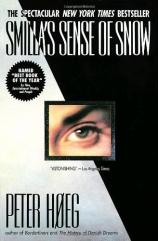Reading Group Guide
Discussion Questions
Smilla's Sense of Snow

1. "It's hard to figure out what genre this dense and tantalizing story belongs to--is it a murder mystery, science fiction, morality tale, or an intricately plotted adventure wrapped in a carapace of technical information, a la Tom Clancy?" --Partisan Review How would you classify Smilla's Sense of Snow? What elements of the book fit into the conventions of the genres named above? Does the book include elements of any other genres? Discuss other books you feel are comparable to Smilla's Sense of Snow.
2. "The portrait of the woman was very important to me. Writing as a woman is an illusion. It was difficult but it was also fun," Peter Høeg has said. "Longing for a woman is one of the strongest moving forces in the life of a man, so maybe this was an attempt to get closer to a woman, to explore the landscape of a woman." Discuss the above statements. How do you feel about a male author writing from the point of view of a woman? How successful was Peter Høeg in portraying the inner life of his heroine, Smilla? What techniques did he use to make his portrait vivid and realistic? Discuss other books in which a man has written from a woman's point of view--or vice versa. How do they compare to Smilla's Sense of Snow?
3. In the course of the novel, Smilla says: "I think more highly of snow and ice than love. It's easier for me to be interested in mathematics than to have affection for my fellow human beings." Is Smilla devoid of feelings or is she merely hiding them? What are the causes of her antisocial behavior? If Smilla does not care for other people, why is she telling her story at all? Is she a reliable narrator when it comes to her analysis of her own personality? Do you feel that Smilla genuinely cares for any other characters in the novel? If so, which ones?
4. Discuss Smilla's relationship with her father. What are the causes of the rift between them? Do you feel he deserves the poor treatment he receives from Smilla? Is there some degree of reconciliation between them in the course of the novel?
5. What impact has Smilla's mother had on her life? How has Smilla dealt with her mother's death over the years? Discuss Smilla's parents as representatives of two different, opposed worlds which Smilla must straddle.
6. "Høeg understands just how Denmark and the Danish character are representative of a larger European attitude toward the non-European world, and the remote and mysterious Inuit are representative of the destruction and transformation all non-European peoples have suffered at the hands of the most well-intentioned colonizers." --Jane Smiley, Washington Post Book World Discuss the clash of cultures portrayed Smilla's Sense of Snow--specifically, Denmark's exploitation of Greenland and the Inuit, and in general, the conflict between the technological culture of the West and traditional, indigenous cultures. How does Smilla herself symbolize this clash? Discuss parallels to similar culture clashes in the United States and elsewhere. Do you agree with Richard Eder's assessment of the novel in the Los Angeles Times as "an anti-colonial thriller"?
7.Smilla's Sense of Snow will be adapted for film. What elements of the book lend themselves to film adaptation? What elements will be difficult to translate to the screen? Come up with your ideal cast for the movies and discuss your choices in terms of the qualities and characteristics that make them right for their character.
8. "The primal stuff of this novel, of course, is snow and ice, which Høeg conjures up in all its varieties--frazil ice, grease ice, pancake, porridge, field ice--with the relish of Richard Burton anatomizing melancholia" --Fernanda Eberstadt, The New Yorker Discuss the significance of the title Smilla's Sense of Snow. What meanings could it have beyond the literal one? What do snow and ice represent to Smilla? To what effect does Høeg use images of, and information about, snow and ice throughout the book?
9. It is rare for a translated book by an unknown foreign author to attain the level of success that Smilla's Sense of Snow has achieved in the United States. What factors do you think most contributed to that success? What did American readers identify with in the novel? What does this book have to say to an American audience?
10. Discuss the moral ambiguity of the supporting characters--the mechanic, Investigator Rivn, Lander, and so on.
Smilla's Sense of Snow
- Publication Date: October 1, 1995
- Paperback: 480 pages
- Publisher: Delta
- ISBN-10: 0385315147
- ISBN-13: 9780385315142







